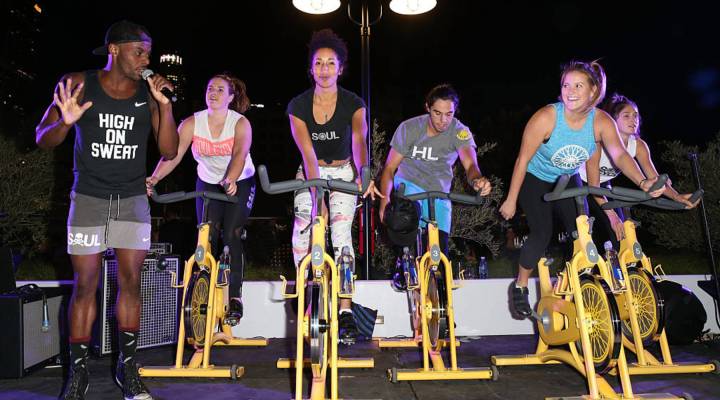
Why fitness is more than a $3 trillion industry

Health conscious consumers have a lot of new ways to work out these days. There’s CrossFit and SoulCycle, Cardio Barre and all kinds of boot camps.
But it turns out all these new ways to work out are also new ways for companies to make a whole lot of money. And it’s more than that; for many, fitness is becoming not a hobby, but a lifestyle.
Jason Kelly is New York bureau chief for Bloomberg, and he writes about the fitness economy in his new book “Sweat Equity: Inside the New Economy of Mind and Body.” Kelly spoke with Kai Ryssdal.
You say fitness is worth some $3.4 trillion dollars in this country?
And what is so interesting about it, I think, is this idea that it has moved from activity to lifestyle. Once it moves to a lifestyle, then you’re not just talking about buying a pair of shoes and buying a pair of shorts, you’re talking about what you eat, where you go on vacation, who you hang out with. It’s just this all-consuming thing that, once you start to live this, a lot of your disposable income goes towards that. And that’s when it becomes an economy.
What is the “mind and body” part here? There is this quasi-religious, sometimes cult-y thing going on.
Well, it is a symptom of our times in many ways. We are an anxiety-ridden, stressed out people here, especially in the urban centers of the United States…. You know, there have been a lot of studies around millennials, especially not going to a lot of organized religion, but they are finding a lot of community in their social groups. And a lot of those social groups are manifesting around fitness boutiques, running clubs, cycling clubs. And part of it is, people feel better after they exercise. It calms them down, and there’s a lot of science around that. You know, you go for a run you clear your head … you feel like you can deal with your life a little better.
And sometimes people are tattooing themselves — branding themselves, literally — with the symbol of their exercise?
Literally branding themselves. Ironman was sort of the first wave of that, but I mean, even with Tough Mudder, some of the gyms, I mean people are really getting into it. And they are self-identifying. And that’s this whole notion that it’s not just something you do, it’s who you are…. One of my early tipoffs, you know, I’ve been covering Wall Street for a number of years, and when I started dealing with all the private equity guys and all the investment bankers, I started to notice that instead of wearing Rolexes, they were wearing Timex Ironman watches because they want to be identified as people who do those sorts of things.
But this is also big money. Ironman sold for almost a billion dollars, is that right?
Right. A very accomplished Ironman, a guy named Jesse Du Bey who I interviewed for the book, was a principal at Providence Equity Partners. [He is] a highly accomplished athlete, and he saw this opportunity to make an investment. They run Ironman, World Triathlon Corp., they expand it dramatically, and a Chinese company, Dalian Wanda, the same folks who run AMC, come in and buy it. And now they are putting on the first Chinese Ironman races.
There’s a lot happening in the world. Through it all, Marketplace is here for you.
You rely on Marketplace to break down the world’s events and tell you how it affects you in a fact-based, approachable way. We rely on your financial support to keep making that possible.
Your donation today powers the independent journalism that you rely on. For just $5/month, you can help sustain Marketplace so we can keep reporting on the things that matter to you.


















